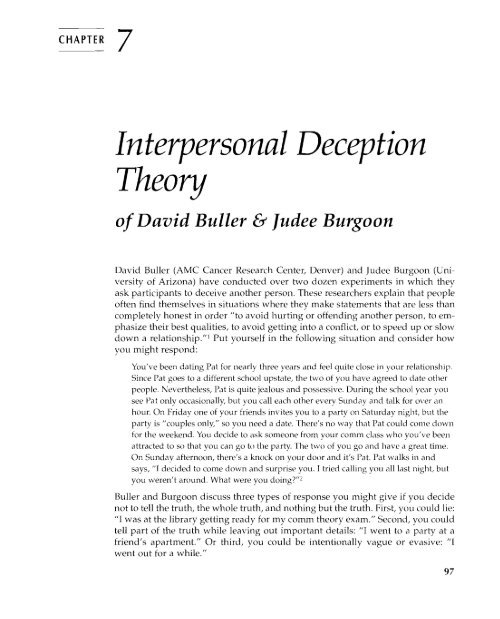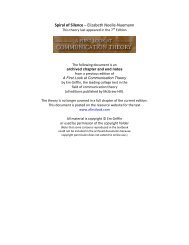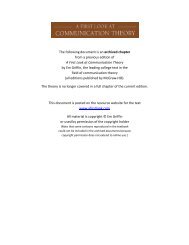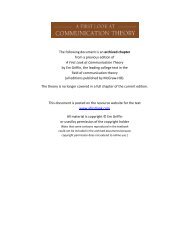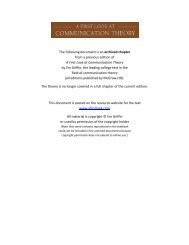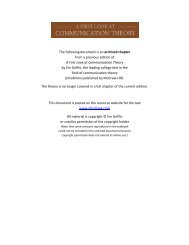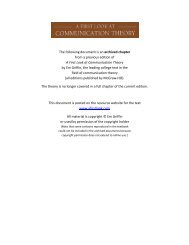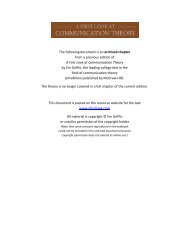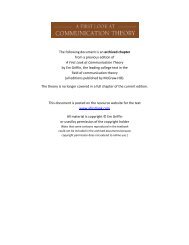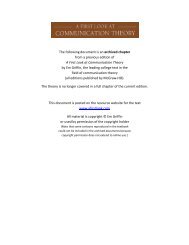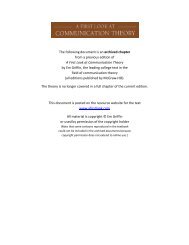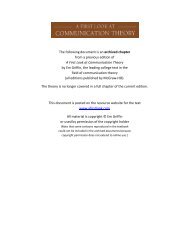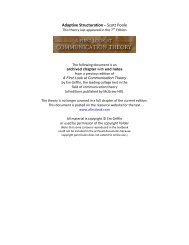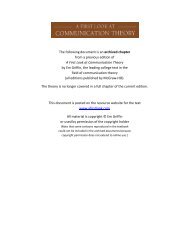Interpersonal Deception Theory (PDF) - A First Look at ...
Interpersonal Deception Theory (PDF) - A First Look at ...
Interpersonal Deception Theory (PDF) - A First Look at ...
- No tags were found...
You also want an ePaper? Increase the reach of your titles
YUMPU automatically turns print PDFs into web optimized ePapers that Google loves.
CHAPTER 7<strong>Interpersonal</strong> <strong>Deception</strong><strong>Theory</strong>of David Buller & Judee BurgoonDavid Buller (AMC Cancer Research Center, Denver) and Judee Burgoon (Universityof Arizona) have conducted over two dozen experiments in which theyask participants to deceive another person. These researchers explain th<strong>at</strong> peopleoften find themselves in situ<strong>at</strong>ions where they make st<strong>at</strong>ements th<strong>at</strong> are less thancompletely honest in order "to avoid hurting or offending another person, to emphasizetheir best qualities, to avoid getting into a conflict, or to speed up or slowdown a rel<strong>at</strong>ionship."l Put yourself in the following situ<strong>at</strong>ion and consider howyou might respond:You've been d<strong>at</strong>ing P<strong>at</strong> for nearly three years and feel quite close ill your rel<strong>at</strong>ionship.Since P<strong>at</strong> goes to a different school upst<strong>at</strong>e, the two of you have agreed to d<strong>at</strong>e otherpeople. Nevertheless, P<strong>at</strong> is quite jealous and possessive. During the school year yousee P<strong>at</strong> only occasionally, but you call each other every Sunday and talk for over anhour. On Friday one of your friends invites you to a party on S<strong>at</strong>urday night, but theparty is "couples only" so you need a d<strong>at</strong>e. There's no way th<strong>at</strong> P<strong>at</strong> could come downfor the weekend. You decide to ask someone from your comm class who you've been<strong>at</strong>tracted to so th<strong>at</strong> you can go to the party. The two of you go and have a gre<strong>at</strong> time.On Sunday afternoon, there's a knock on your door and it's P<strong>at</strong>. P<strong>at</strong> walks in andsays, "1 decided to come down and surprise you. 1 tried calling you all last night, butyou weren't around. Wh<strong>at</strong> were you doing?"2Buller and Burgoon discuss three types of response you might give if you decidenot to tell the truth, the whole truth, and nothing but the truth. <strong>First</strong>, yOll could lie:"1 was <strong>at</strong> the library getting ready for my comm theory exam." Second, you couldtell part of the truth while leaving out important details: "1 went to a party <strong>at</strong> afriend's apartment." Or third, you could be intentionally vague or evasive: "1went out for a while."97


